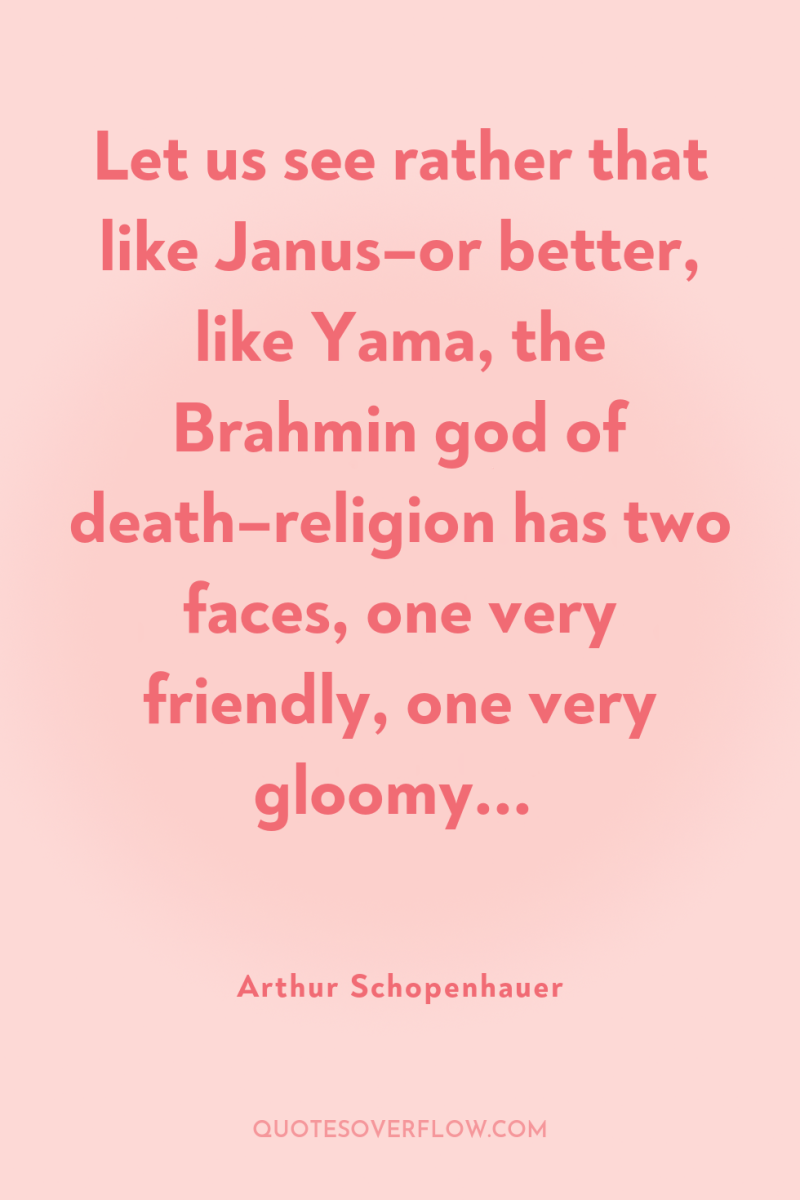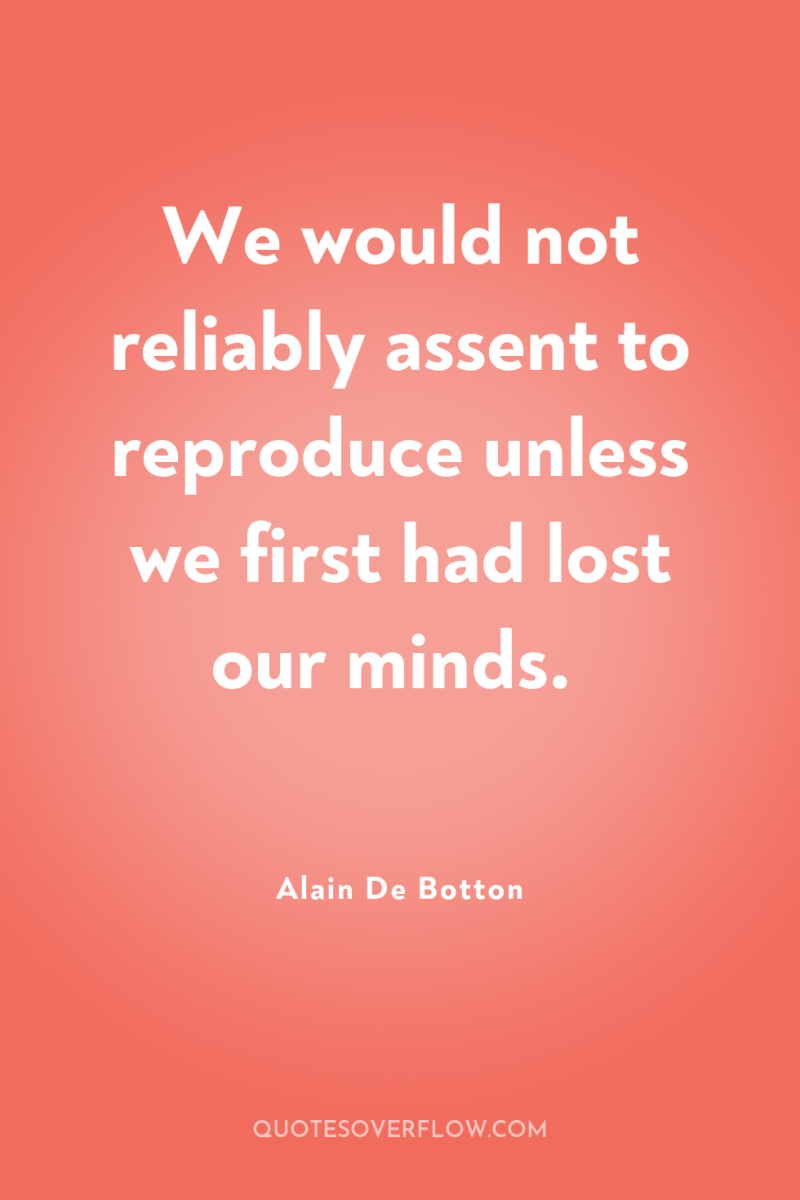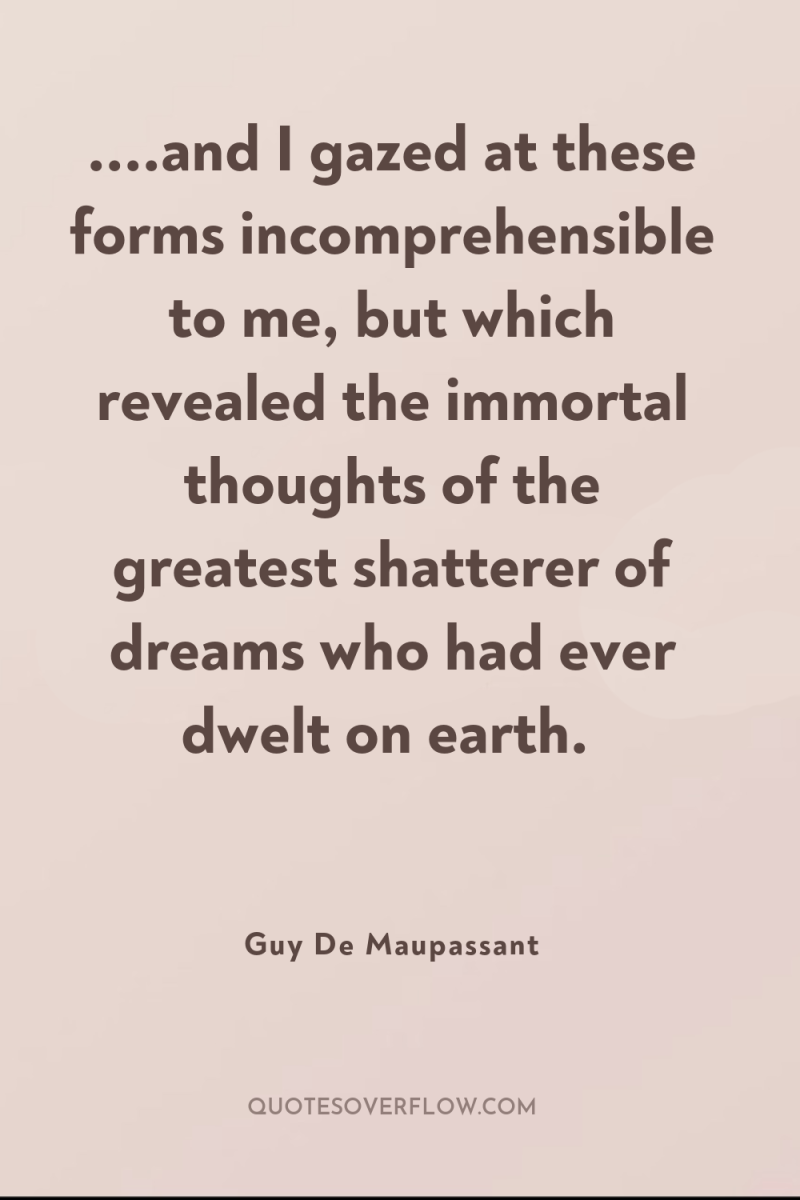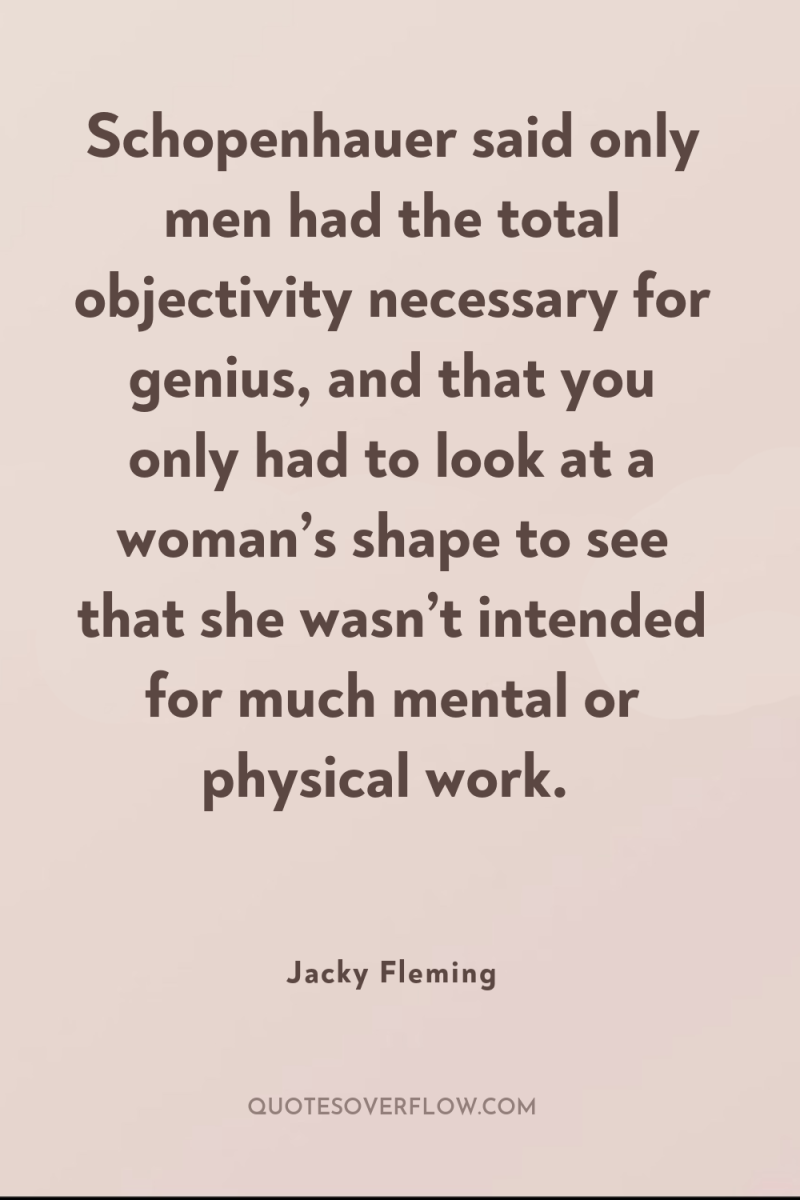1
It often happens that we blurt out things that may in some kind of way be harmful to us, but we are silent about things that may make us look ridiculous; because in this case effect follows very quickly on cause.Arthur Schopenhauer
2
NOT to my contemporaries, not to my compatriots but to mankind I commit my now completed work in the confidence that it will not be without value for them, even if this should be late recognised, as is commonly the lot of what is good. For it cannot have been for the passing generation, engrossed with the delusion of the moment, that my mind, almost against my will, has uninterruptedly stuck to its work through the course of a long life.preface to the second edition of "the world as will and representation .Arthur Schopenhauer
3
The freedom of an unscheduled afternoon brought confusion rather than joy. Julius had always been focused. When he was not seeing patients, other important projects and activities-writing, teaching, tennis, research-clamored for his attention. But today nothing seemed important. He suspected that nothing had ever been important, that his mind had arbitrarily imbued projects with importance and then cunningly covered its traces. Today he saw through the ruse of a lifetime. Today there was nothing important to do, and he ambled aimlessly down Union Street. .Irvin D. Yalom
4
There is not much to be got anywhere in the world. It is filled with misery and pain; if a man escapes these, boredeom lies in wait for him at every corner. Nay more; it is evil which generally has the upper hand, and folly that makes the most noise. Fate is cruel and mankind pitiable.Arthur Schopenhauer
5
The most perfect and satisfactory knowledge is that of perception but this is limited to the absolutely particular, to the individual. The comprehension of the many and the various into *one* representation is possible only through the *concept*, in other words, by omitting the differences; consequently, the concept is a very imperfect way of representing things. The particular, of course, can also be apprehended immediately as a universal, namely when it is raised to the (Platonic) *Idea*; but in this process, which I have analysed in the third book, the intellect passes beyond the limits of individuality and therefore of time; moreover, this is only an exception. These inner and essential imperfections of the intellect are further increased by a disturbance to some extent external to it but yet inevitable, namely, the influence that the *will* exerts on all its operations, as soon as that will is in any way concerned in their result. Every passion, in fact every inclination or disinclination, tinges the objects of knowledge with its colour. Most common of occurrence is the falsification of knowledge brought about by desire and hope, since they show us the scarcely possible in dazzling colours as probable and well-nigh certain, and render us almost incapable of comprehending what is opposed to it. Fear acts in a similar way; every preconceived opinion, every partiality, and, as I have said, every interest, every emotion, and every predilection of the will act in an analogous manner. Finally, to all these imperfections of the intellect we must also add the fact that it grows old with the brain; in other words, like all physiological functions, it loses its energy in later years; in this way all its imperfections are then greatly increased.”–from_ The World as Will and Representation_. Translated from the German by E. F. J. Payne in two volumes: volume II, pp. 139-141.Arthur Schopenhauer
6
What is more, in fact, we very soon look upon the world as something whose non-existence is not only conceivable, but even preferable to its existence. Therefore our astonishment at it easily passes into a brooding over that *fatality* which could nevertheless bring about its existence, and by virtue of which such an immense force as is demanded for the production and maintenance of such a world could be directed so much against its own interest and advantage."―from_ The World as Will and Representation_. Translated from the German by E. F. J. Payne. In Two Volumes, Volume II, p. 171 .Arthur Schopenhauer
7
In fact, the balance wheel which maintains in motion the watch of metaphysics that never runs down, is the clear knowledge that this world's non-existence is just as possible as its existence."―from_ The World as Will and Representation_. Translated from the German by E. F. J. Payne. In Two Volumes, Volume II, p. 171Arthur Schopenhauer
8
We also find *physics*, in the widest sense of the word, concerned with the explanation of phenomena in the world; but it lies already in the nature of the explanations themselves that they cannot be sufficient. *Physics* is unable to stand on its own feet, but needs a *metaphysics* on which to support itself, whatever fine airs it may assume towards the latter. For it explains phenomena by something still more unknown than are they, namely by laws of nature resting on forces of nature, one of which is also the vital force. Certainly the whole present condition of all things in the world or in nature must necessarily be capable of explanation from purely physical causes. But such an explanation―supposing one actually succeeded so far as to be able to give it―must always just as necessarily be burdened with two essential imperfections (as it were with two sore points, or like Achilles with the vulnerable heel, or the devil with the cloven foot). On account of these imperfections, everything so explained would still really remain unexplained. The first imperfection is that the *beginning* of the chain of causes and effects that explains everything, in other words, of the connected and continuous changes, can positively *never* be reached, but, just like the limits of the world in space and time, recedes incessantly and *in infinitum*. The second imperfection is that all the efficient causes from which everything is explained always rest on something wholly inexplicable, that is, on the original *qualities* of things and the *natural forces* that make their appearance in them. By virtue of such forces they produce a definite effect, e.g., weight, hardness, impact, elasticity, heat, electricity, chemical forces, and so on, and such forces remain in every given explanation like an unknown quantity, not to be eliminated at all, in an otherwise perfectly solved algebraical equation. Accordingly there is not a fragment of clay, however little its value, that is not entirely composed of inexplicable qualities. Therefore these two inevitable defects in every purely physical, i.e., causal, explanation indicate that such an explanation can be only *relatively* true, and that its whole method and nature cannot be the only, the ultimate and hence sufficient one, in other words, cannot be the method that will ever be able to lead to the satisfactory solution of the difficult riddles of things, and to the true understanding of the world and of existence; but that the *physical* explanation, in general and as such, still requires one that is *metaphysical*, which would furnish the key to all its assumptions, but for that very reason would have to follow quite a different path. The first step to this is that we should bring to distinct consciousness and firmly retain the distinction between the two, that is, the difference between *physics* and *metaphysics*. In general this difference rests on the Kantian distinction between *phenomenon* and *thing-in-itself*. Just because Kant declared the thing-in-itself to be absolutely unknowable, there was, according to him, no *metaphysics* at all, but merely immanent knowledge, in other words mere *physics*, which can always speak only of phenomena, and together with this a critique of reason which aspires to metaphysics."―from_ The World as Will and Representation_. Translated from the German by E. F. J. Payne. In Two Volumes, Volume II, pp. 172-173 .Arthur Schopenhauer

9
Truth is most beautiful undraped.Arthur Schopenhauer
10
A book can never be anything more than the impress of its author's thoughts; and the value of these will lie either in the matter about which he has thought, or in the form which his thoughts take, in other words, what it is that he has thought about it.Arthur Schopenhauer

11
Let us see rather that like Janus–or better, like Yama, the Brahmin god of death–religion has two faces, one very friendly, one very gloomy...Arthur Schopenhauer
12
Everyone endeavours to eliminate through the other individual his own weaknesses, defects, and deviations from the type, lest they be perpetuated or even grow into complete abnormalities in the child which will be produced.Alain De Botton

13
We would not reliably assent to reproduce unless we first had lost our minds.Alain De Botton
14
That streetside tree is obscuring the air. Cut it down. Haul it in for questioning. There are secrets within that foliage. You might want to separate the branches in different rooms and apply some elementary game theory.”“ Question a plant?”“ Trees have a will too, just like people. We have to know it’s purpose. Read Schopenhauer.”“Schopenwho?”“He was the only authentic German. You might like him. Being a police officer, you’re undoubtedly familiar with the need to put an end to the lives of the perverse when sex crimes go too far. Now just generalize that necessity to every human being. .Benson Bruno

15
....and I gazed at these forms incomprehensible to me, but which revealed the immortal thoughts of the greatest shatterer of dreams who had ever dwelt on earth.Guy De Maupassant

16
Schopenhauer said only men had the total objectivity necessary for genius, and that you only had to look at a woman’s shape to see that she wasn’t intended for much mental or physical work.Jacky Fleming
17
The essence of art is that its one case applies to thousands, ' knew Schopenhauer.Alain De Botton
18
Reading is thinking with someone else's head instead of ones own.Arthur Schopenhauer
19
[On Schopenhauer in Black and White] Schopenhauer's views of love are flawed. Love can't be merely an illusion of the mind to aid in procreation, but the path to redemption for an otherwise violently selfish species. Past human greatness has proven that when challenged, love can overpower impulsive instinct, and in essence, the vilest aspects of our nature.Tiffany Madison
20
Any foolish boy can stamp on a beetle, but all the professors in the world cannot make a beetle.Arthur Schopenhauer
21
The will has no overall purpose, aims at no highest good, and can never be satisfied. Although it is our essence, it strikes us as an alien agency within, striving for life and procreation blindly, mediated only secondarily by consciousness. Instinctive sexuality is at our core, interfering constantly with the life of the intellect. To be an individual expression of this will is to lead a life of continual desire, deficiency, and suffering. Pleasure or satisfaction exists only relative to a felt lack; it is negative, merely the cessation of an episode of striving or suffering, and has no value of itself. Nothing we can achieve by conscious act of will alters the will to life within us. There is no free will. Human actions, as part of the natural order, are determined [..] As individual parts of the empirical world we are ineluctably pushed through life by a force inside us which is not of our choosing, which gives rise to needs and desires we can never fully satisfy, and is without ultimate purpose. Schopenhauer concludes that it would have been better not to exist–and that the world itself is something whose existence we should deplore rather than celebrate.Christopher Janaway
22
If you want a safe compass to guide you through life, and to banish all doubt as to the right way of looking at it, you cannot do better than accustom yourself to regard this world as a penitentiary.. - If you accustom yourself to this view of life you will regulate your expectations accordingly, and cease to look upon all its disagreeable incidents, great and small, its sufferings, its worries, its misery, as anything unusual or irregular; nay, you will find that everything is as it should be, in a world where each of us pays the penalty of existence in his own peculiar way.Arthur Schopenhauer
23
However, the struggle with that sentinel is, as a rule, not so hard as it may seem from a long way off, mainly in consequence of the antagonism between the ills of the body and the ills of the mind. If we are in great bodily pain, or the pain lasts a long time, we become indifferent to other troubles; all we think about is to get well. In the same way great mental suffering makes us insensible to bodily pain; we despise it; nay, if it should outweigh the other, it distracts our thoughts, and we welcome it as a pause in mental suffering. It is this feeling that makes suicide easy; for the bodily pain that accompanies it loses all significance in the eyes of one who is tortured by an excess of mental suffering. This is especially evident in the case of those who are driven to suicide by some purely morbid and exaggerated ill-humor. No special effort to overcome their feelings is necessary, nor do such people require to be worked up in order to take the step; but as soon as the keeper into whose charge they are given leaves them for a couple of minutes, they quickly bring their life to an end. When, in some dreadful and ghastly dream, we reach the moment of greatest horror, it awakes us; thereby banishing all the hideous shapes that were born of the night. And life is a dream: when the moment of greatest horror compels us to break it off, the same thing happens.Arthur Schopenhauer
24
The only way you can talk about this great tide in which you’re a participant is as Schopenhauer did: the universe is a dream dreamed by a single dreamer where all the dream characters dream too.Joseph Campbell
25
Unless suffering is the direct and immediate object of life, our existence must entirely fail of its aim. It is absurd to look upon the enormous amount of pain that abounds everywhere in the world, and originates in needs and necessities inseparable from life itself, as serving no purpose at all and the result of mere chance. Each separate misfortune, as it comes, seems, no doubt, to be something exceptional; but misfortune in general is the rule. I know of no greater absurdity than that propounded by most systems of philosophy in declaring evil to be negative in its character. Evil is just what is positive; it makes its own existence felt.Arthur Schopenhauer
26
Now this was possible only by a man determining himself entirely *rationally* according to concepts, not according to changing impressions and moods. But as only the maxims of our conduct, not the consequences or circumstances, are in our power, to be capable of always remaining consistent we must take as our object only the maxims, not the consequences and circumstances, and thus the doctrine of virtue is again introduced.”–from_ The World as Will and Representation_. Translated from the German by E. F. J. Paye in two volumes: volume I, p. 89.Arthur Schopenhauer
27
And involuntarily I compared the childish sarcasm, the religious sarcasm of Voltaire with the irresistible irony of the German philosopher whose influence is henceforth ineffaceable.Guy De Maupassant
28
I bear within me the seed, the rudiments, the possibility of life's capacities and endeavors. Where might I be, if I were not here? Who, what, how could I be, if I were not me, if this outward appearance that is me did not encase me, separating my consciousness from that of others who are not me? An organism–a blind, rash, pitiful eruption of the insistent assertion of the will. Far better, really, if that will were to drift free in a night without time or space, than to languish in a prison cell lit only by the flickering, uncertain flame of the intellect.Thomas Mann
29
From *the form of time and of the single dimension* of the series of representations, on account of which the intellect, in order to take up one thing, must drop everything else, there follows not only the intellect’s distraction, but also its *forgetfulness*. Most of what it has dropped it never takes up again, especially as the taking up again is bound to the principle of sufficient reason, and thus requires an occasion which the association of ideas and motivation have first to provide. Yet this occasion may be the remoter and the smaller, the more our susceptibility to it is enhanced by interest in the subject. But, as I have already shown in the essay *On the Principle of Sufficient Reason*, memory is not a receptacle, but a mere faculty, acquired by practice, of bringing forth any representations at random, so that these have always to be kept in practice by repetition, otherwise they are gradually lost. Accordingly, the knowledge even of the scholarly head exists only *virtualiter* as an acquired practice in producing certain representations. *Actualiter*, on the other hand, it is restricted to one particular representation, and for the moment is conscious of this one alone. Hence there results a strange contrast between what a man knows *potentia* and what he knows *actu*, in other words, between his knowledge and his thinking at any moment. The former is an immense and always somewhat chaotic mass, the latter a single, distinct thought. The relation is like that between the innumerable stars of the heavens and the telescope’s narrow field of vision; it stands out remarkably when, on some occasion, a man wishes to bring to distinct recollection some isolated fact from his knowledge, and time and trouble are required to look for it and pick it out of that chaos. Rapidity in doing this is a special gift, but depends very much on the day and the hour; therefore sometimes memory refuses its service, even in things which, at another time, it has ready at hand. This consideration requires us in our studies to strive after the attainment of correct insight rather than an increase of learning, and to take to heart the fact that the *quality* of knowledge is more important than its quantity. Quantity gives books only thickness; quality imparts thoroughness as well as style; for it is an *intensive* dimension, whereas the other is merely extensive. It consists in the distinctness and completeness of the concepts, together with the purity and accuracy of the knowledge of perception that forms their foundation. Therefore the whole of knowledge in all its parts is permeated by it, and is valuable or troubling accordingly. With a small quantity but good quality of knowledge we achieve more than with a very great quantity but bad quality."–from_ The World as Will and Representation_. Translated from the German by E. F. J. Payne in two volumes: volume II, pp. 139-141 .Arthur Schopenhauer
30
The true basis and propaedeutic for all knowledge of human nature is the persuasion that a man's actions are, essentially and as a whole, not directed by his reason and its designs; so that no one becomes this or that because he wants to, though he want to never so much, but that his conduct proceeds from his inborn and inalterable character, is narrowly and in particulars determined by motivation, and is thus necessarily the product of these two factors.Arthur Schopenhauer
31
This, for both Schopenhauer and Tolstoy, is the central tragedy of human life; if only men would learn how little the cleverest and most gifted among them can control, how little they can know of all the multitude of factors the orderly movement of which is the history of the world; above all, what presumptuous nonsense it is to claim to perceive an order merely on the strength of believing desperately that an order must exist, when all one actually perceives is meaningless chaos —a chaos of which the heightened form, the microcosm in which the disorder of human life is reflected in an intense degree, is war.Isaiah Berlin
32
Spinoza says that if a stone which has been projected through the air, had consciousness, it would believe that it was moving of its own free will. I add this only, that the stone would be right. The impulse given it is for the stone what the motive is for me, and what in the case of the stone appears as cohesion, gravitation, rigidity, is in its inner nature the same as that which I recognise in myself as will, and what the stone also, if knowledge were given to it, would recognise as will.Arthur Schopenhauer
33
What light is to the outer physical world intellect is to the inner world of consciousness. For intellect is related to the will, and thus also to the organism which is nothing other than will regarded objectively, in the approximate same way as light is to a combustible body and the oxygen in combination with which it ignites.Arthur Schopenhauer
34
[I]n other words, we should live with due knowledge of the course of things in the world. For whenever a man in any way loses self-control, or is struck down by a misfortune, grows angry, or loses heart, he shows in this way that he finds things different from what he expected, and consequently that he laboured under a mistake, did not know the world and life, did not know how at every step the will of the individual is crossed and thwarted by the chance of inanimate nature, by contrary aims and intentions, even by the malice inspired in others. Therefore either he has not used his reason to arrive at a general knowledge of this characteristic of life, or he lacks the power of judgement, when he does not again recognize in the particular what he knows in general, and when he is therefore surprised by it and loses his self-control. Thus every keen pleasure is an error, an illusion, since no attained wish can permanently satisfy, and also because every possession and every happiness is only lent by chance for an indefinite time, and can therefore be demanded back in the next hour. Thus both originate from defective knowledge. Therefore the wise man always holds himself aloof from jubilation and sorrow, and no event disturbs his ἀταÏαξία [ataraxia]."–from_The World as Will and Representation_. Translated from the German by E. F. J. Paye in two volumes: volume I, p. 88 .Arthur Schopenhauer
35
In consequence of the inevitably scattered and fragmentary nature of our thinking, which has been mentioned, and of the mixing together of the most heterogeneous representations thus brought about and inherent even in the noblest human mind, we really possess only *half a consciousness*. With this we grope about in the labyrinth of our life and in the obscurity of our investigations; bright moments illuminate our path like flashes of lighting. But what is to be expected generally from heads of which even the wisest is every night the playground of the strangest and most senseless dreams, and has to take up its meditations again on emerging from these dreams? Obviously a consciousness subject to such great limitations is little fitted to explore and fathom the riddle of the world; and to beings of a higher order, whose intellect did not have time as its form, and whose thinking therefore had true completeness and unity, such an endeavor would necessarily appear strange and pitiable. In fact, it is a wonder that we are not completely confused by the extremely heterogeneous mixture of fragments of representations and of ideas of every kind which are constantly crossing one another in our heads, but that we are always able to find our way again, and to adapt and adjust everything. Obviously there must exist a simple thread on which everything is arranged side by side: but what is this? Memory alone is not enough, since it has essential limitations of which I shall shortly speak; moreover, it is extremely imperfect and treacherous. The *logical ego*, or even the *transcendental synthetic unity of apperception*, are expressions and explanations that will not readily serve to make the matter comprehensible; on the contrary, it will occur to many that“ Your wards are deftly wrought, but drive no bolts asunder.” Kant’s proposition: “The *I think* must accompany all our representations , ” is insufficient; for the “I” is an unknown quantity, in other words, it is itself a mystery and a secret. What gives unity and sequence to consciousness, since by pervading all the representations of consciousness, it is its substratum, its permanent supporter, cannot itself be conditioned by consciousness, and therefore cannot be a representation. On the contrary, it must be the *prius* of consciousness, and the root of the tree of which consciousness is the fruit. This, I say, is the *will*; it alone is unalterable and absolutely identical, and has brought forth consciousness for its own ends. It is therefore the will that gives unity and holds all its representations and ideas together, accompanying them, as it were, like a continuous ground-bass. Without it the intellect would have no more unity of consciousness than has a mirror, in which now one thing now another presents itself in succession, or at most only as much as a convex mirror has, whose rays converge at an imaginary point behind its surface. But it is *the will* alone that is permanent and unchangeable in consciousness. It is the will that holds all ideas and representations together as means to its ends, tinges them with the colour of its character, its mood, and its interest, commands the attention, and holds the thread of motives in its hand. The influence of these motives ultimately puts into action memory and the association of ideas. Fundamentally it is the will that is spoken of whenever “I” occurs in a judgement. Therefore, the will is the true and ultimate point of unity of consciousness, and the bond of all its functions and acts. It does not, however, itself belong to the intellect, but is only its root, origin, and controller."–from_ The World as Will and Representation_. Translated from the German by E. F. J. Payne in two volumes: volume II, pp. 139-140.Arthur Schopenhauer